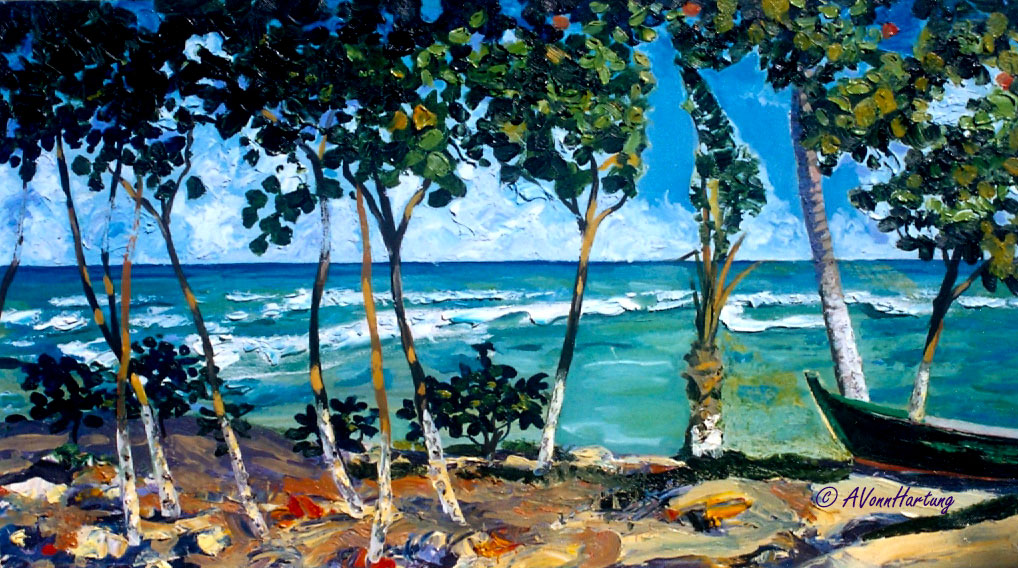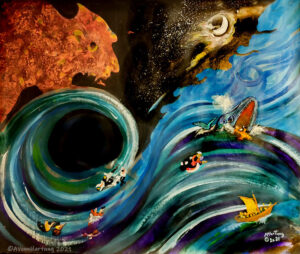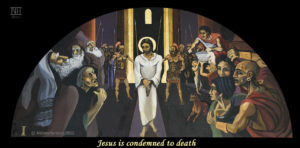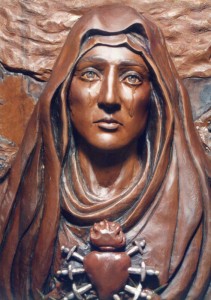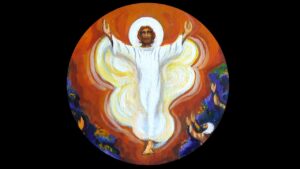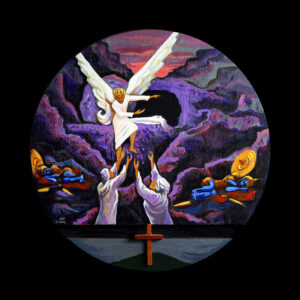Mi padre, Arthur Hartung, era suboficial jefe en el batallón de construcción Seabees de la Marina de los EE. UU. Después de la Segunda Guerra Mundial y el inicio del Plan Marshall de EE. UU. en el Pacífico Sur, fue enviado al atolón insular de Kwajalein en las Islas Marshall, ubicado en Micronesia, a unas 2000 millas náuticas al suroeste de Hawái.
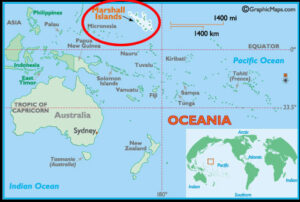
Kwajalein es el atolón más grande de la tierra, que consta de más de 90 islas en su collar de cadena viviente.
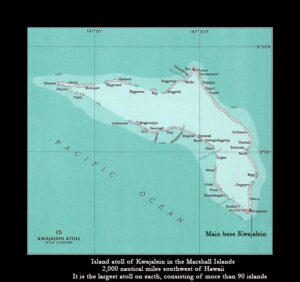
Allí mi padre se sintió como en casa. Su vocación era la pesca, y en su juventud fue un ávido cazador. Cuando era niño, recuerdo muchos días pescando, pescando langostas y vieiras con él y muchas noches largas y frías cuando cubríamos millas de salientes de tierras altas en los bosques de Flanders de Connecticut, cazando mapaches hasta el amanecer con su par de perros.
Cuando era un esposo joven, se instaló con su querida esposa Phyllis y su familia a lo largo de las orillas del río Niantic, uno de los estuarios más ricos que se abría hacia Long Island Sound, no lejos de la granja familiar de Soundview.
Ahora, con su nueva asignación, estaba dejando los entornos familiares de su hogar por la desconocida pero seductora llamada de islas distantes.
Al llegar a Kwajalein, la isla más grande de la cadena, se puso al mando de un grupo de construcción formado por marineros alistados y muchos más isleños indígenas conocidos como nativos.
Los marines estadounidenses que supervisaban la seguridad en las islas miraban a los nativos con cierta inquietud y sospecha, ya que antes de que los estadounidenses tomaran las islas, los japoneses las habían habitado durante unos 30 años. En consecuencia, los nativos hablaban japonés con fluidez, así como su propio idioma malayo-polinesio. Debido a esto, a los nativos no se les permitía permanecer en la isla principal por la noche, sino que se les exigía que fueran todos los días a la puesta del sol a sus hogares en una isla cercana y regresaran cada mañana al trabajo.
Esta indignidad no era nueva para los indígenas de la isla, ya que sufrían una larga historia de dominación extranjera. Su historia se remonta a antes del nacimiento de Cristo.
Las islas que llevan el nombre de John Marshall, el explorador británico que navegó hacia ellas alrededor de 1788, probablemente fueron descubiertas primero por Occidente en la persona del navegante español Álvaro de Saavedra, alrededor de 1529. Los españoles los vendieron a los alemanes en 1886, quienes los perdieron ante los japoneses durante la Primera Guerra Mundial, quienes los perdieron ante las fuerzas estadounidenses que desembarcaron allí en 1944.
Mi padre, un católico devoto, vio la bondad aparente en estas personas amables y felices. Me dijo que tenían un espíritu de bondad, inocencia y profunda alegría, de lo que nunca dejaba de maravillarse.
Sin verse afectados por la evidente inquietud y desconfianza de los marines, los nativos tenían una serenidad, un respeto por sí mismos y una seguridad que venían, al parecer, a mi padre, como fuerzas de intuición que formaban parte integral de las fuerzas de la vida, la naturaleza, el mar y la preciosa tierra que les dio una especie de sabiduría ancestral al compartir su isla paradisíaca.
Observó su gran habilidad en las formas naturales de vida, una amabilidad confiada y un sentido de bienestar, sin duda elaborado por el catolicismo de los españoles, el luteranismo de los alemanes y muy probablemente redondeado por las influencias sintoístas y budistas de los japoneses.
Mi padre, que también era carpintero, descubrió que los hombres eran hábiles en muchas disciplinas: navegantes, pescadores y cazadores dotados. Artistas en el diseño y la construcción de sus modestas casas y sus canoas con estabilizadores que tenían dos extremos con velas tejidas de fibra triangular que simplemente podían invertirse para cambiar de dirección al ir o venir con los vientos alisios.
Tanto los hombres como las mujeres tenían un gran talento en las artes tradicionales de sus antepasados: joyas hechas con las conchas marinas más hermosas, implementos de carey de todo tipo, incluidos abanicos de plumas en forma de corazón deliciosamente hermosos y todos los artículos domésticos necesarios en el pueblo.
El único arte que les resultó difícil dominar fue el de las numerosas y peligrosas máquinas eléctricas que tuvieron que aprender a manejar en los talleres de carpintería, tan esenciales para su trabajo. La seguridad en el trabajo se convirtió en una prioridad principal y para lograr este fin, mi padre dedicó una gran cantidad de tiempo y sufrimiento junto con ellos cuando perdían un dedo o algo peor en las diversas sierras eléctricas y otros equipos.
Mi padre también se enteró, para su disgusto, de la habilidad y sabiduría de los nativos como marineros, cuando me contó de la vez que algunos de ellos no se presentaron a trabajar, luego de una repentina tormenta tropical. Preocupado, mi padre navegó a su isla para preguntar qué había sucedido. Al enterarse de que nunca habían regresado después de su partida para el trabajo ese día, quiso solicitar un grupo de búsqueda de la marina para buscarlos. Esto angustió mucho a los ancianos nativos, y recibió una lección duradera sobre el arte de navegar de estos intrépidos y dotados marineros cuando reaparecieron desde el sur varios días después.
A partir de entonces sintió un profundo respeto por sus antiguas costumbres y la fuerza e integridad de sus creencias.
También se dio cuenta de la propensión de algunos de los marineros a “redireccionar” ciertas propiedades gubernamentales deseables a los marinos mercantes que pasaban, a cambio de dólares estadounidenses, que luego usarían para cancelar las deudas de juego.
Este problema llegó a un punto crítico cuando, después de un inventario no anunciado de materiales, se descubrió que ciertos elementos no podían ser contabilizados y se descubrieron pruebas de que la desaparición de los materiales apuntaba a los nativos. Quedaba en manos de mi padre resolver el problema. Habló a todos sus hombres juntos, y luego habló tanto a los marineros alistados como a los trabajadores nativos por separado. Estaba convencido de que no era ninguno de sus trabajadores los responsables, sino que las pruebas que apuntaban a los indígenas habían sido sembradas por los ladrones, lo que llevó la situación a un punto crucial porque entonces se acusaba a los indígenas de los robos, y por lo tanto, se produjeron interrogatorios más duros.
Fue entonces cuando mi padre pudo demostrar que las pruebas habían sido sembradas para arrojar sospechas sobre ellos a propósito, y que los objetos sustraídos no podían habérselos llevado ellos, por su falta de capacidades físicas, sino que el robo tenía que haber sido orquestados desde adentro.
La investigación y los interrogatorios se ampliaron y, los oficiales a cargo atraparon a un marinero fuera del batallón de construcción en algunas mentiras. Finalmente confesó, por lo que se descubrió la conspiración y se castigó a los marineros culpables.
Debido a que mi padre había trazado una línea en la arena para responder por sus hombres, se ganó un profundo respeto por parte de todos los involucrados, especialmente de los nativos. A partir de entonces, los nativos hablaron de su rango de Jefe con gran reverencia. Y era con reverencia cada vez que mi padre hablaba de ellos y se sonrojaba con cálidos recuerdos de su tiempo en las islas. Le invadía un gozo exuberante al relatar estos recuerdos; parecía oscilar en un ritmo diferente de habla. Era una mezcla de profunda emoción, buen humor y entusiasmo infantil que de alguna manera entendíamos como cualidades espirituales que le habían sido transmitidas.
Las historias que nos contó no eran grandes aventuras en el sentido clásico, muchas eran solo bocetos de la vida cotidiana, aunque algunas contenían un elemento de peligro, como el momento en que él y un pequeño grupo fueron cortados de sus barcos por una marea creciente. mientras perseguía a los peces a lo largo del arrecife. Apenas lograron regresar a través del agua que se precipitaba hasta el cuello con tiburones moviéndose.
Todo esto fue extremadamente emocionante para nosotros, los niños, debido a los lugares exóticos, los nombres extraños y quizás debido a nuestra propia imaginación vívida que encaja bien en este paraíso tropical.
Mi padre, que no fumaba ni bebía, prefería pasar los fines de semana, las vacaciones y los ratos libres con los nativos en sus islas, pescando y cazando.
Como a los nativos no se les permitía tener armas de fuego, cazaban jabalíes y chivos a la manera tradicional, con trampas y armas de mano. Atraparon a las aves marinas con trampas de alambre clavadas en la arena con pequeños peces vivos colocados a ambos lados de la trampa. Tenían una variedad de redes, pero también se zambullían en forma libre para pescar pulpos, langostas, almejas gigantes y tortugas marinas cazadas. Al final de un buen fin de semana de pesca o caza, hervían su botín especiado con arroz en una concha de almeja gigante sobre una hoguera abierta y compartían con los aldeanos historias de la caza.
Estas historias tuvieron una influencia profunda y duradera en mi propia vida.
Las imágenes de escenarios deslumbrantemente hermosos de lagunas turquesas, playas deslumbrantemente blancas que acunan cardúmenes de peces escandalosamente coloridos, y los nativos junto con sus familias extendidas compartiendo comidas y compañía completaron para mí una imagen idílica de cómo se debe vivir la vida.
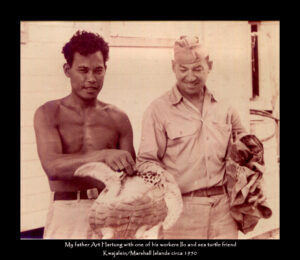
Recuerdo el día en que esperábamos que mi padre regresara a casa. Estábamos pasando la mañana jugando fútbol americano en el terreno baldío al lado de nuestra casa. Junto al solar, en la mitad superior de una casa de dos plantas, vivía la señora Butterfield, una buena amiga de Alicia Hartung, la hermana menor de mi padre. Poco sabíamos que Alicia estaba de visita allá arriba, mirándonos jugar y también esperando el regreso de mi padre.
En medio de nuestro juego, vimos que algo cayó al suelo. Para nuestro asombro, era una lata de cerveza vacía. De ella sobresalía una nota. Mientras nos acurrucábamos rápidamente para leer la nota, todos al mismo tiempo levantamos la mirada hacia el cielo para seguir el avión de pasajeros que lentamente atravesaba el cielo azul.
¡¡¡Increíble!!! ¡Papá nos envió una nota! Decía “A punto de aterrizar en el aeropuerto de Groton. Papá.” ¡Un momento que jamás olvidaré!
Corrimos, dos equipos en uno, atravesando la puerta principal de nuestra casa para compartir la noticia con mi madre. Lo que pasó después de eso aún no está claro. Creencia se encuentra con incredulidad. Pero sí recuerdo que mi madre se fue más temprano que tarde y todos vitoreamos cuando finalmente regresó, entrando a nuestra entrada con mi padre, sonriendo con su mejor traje azul marino. Tía Alicia, animadora principal.
Fue unos 3 meses después cuando llegó el primer baúl grande. Un baúl lleno del mayor tesoro que jamás habíamos visto. ¡Algo salido de Treasure Island o Arabian Nights! Capas y capas de collares de concha de cauri, abanicos de plumas de concha de tortuga y palma, incluso faldas de hierba. En total llegaron tres baúles.
Fueron obsequios que le dieron a mi padre en un evento de despedida antes de su partida de la isla. Durante la celebración los vecinos del pueblo le rindieron homenaje, depositando cada uno de los miembros ante él un regalo muy anhelado, en agradecimiento a su amistad.
Sé que estar lejos de su querida esposa Phyllis y de nosotros los niños hizo que su vida y sus metas se enfocaran más claramente. No sé si alguna vez se mantuvo en contacto con sus amigos en las islas. Me parece recordar que se intercambiaron algunas cartas, pero su vida allí se desvaneció entre los restos de las historias que nos contó y de los preciosos recuerdos que compartió.
Continuó sirviendo en las reservas de la Marina con breves períodos a lo largo de la costa este y en la Bahía de Guantánamo en Cuba. Eventualmente, se retiró tanto de la Marina como de su trabajo relacionado en el servicio civil. Continuó pescando langostas, almejas y vieiras en su querido estuario y sus alrededores.
Cuando era joven, tenía cuatro o cinco amigos fijos con los que iba a pescar. En años posteriores, debido a la muerte o la enfermedad, el número se redujo a uno solo, su más antiguo y querido amigo George Cone.
Y finalmente, pescaba solo.
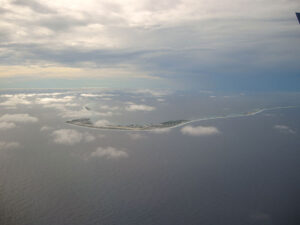
Creo que en las islas vislumbró un pedacito de paraíso, porque a partir de entonces siempre pareció más espiritual, deliberado y realizado.
Si hemos visto un lugar singularmente hermoso y vivido desde entonces en su aura, si nos hemos encontrado con un lugar extraño y exótico y hemos absorbido algo de su misterio en nuestra alma, ¿no tenemos que perder también algo? ¿Renunciar a algo a cambio?
Pregunto esto porque noté en años posteriores una especie de distanciamiento que lo invadía, tal vez incluso una tristeza, sentado en su sillón esperando que los largos y fríos inviernos se descongelaran, esperando la primavera, esperando volver a pescar.
¿Estaba en su mirada lejana sólo la fascinante perspectiva de los años? ¿O era otra cosa, algo más…?
algo que podía ver con más claridad ahora que envejecía… algo distante pero acercándose, más allá del horizonte… algo que había conocido una vez antes… donde el invierno es solo un cambio en los vientos alisios, donde los bancos de peces en las aguas poco profundas claras y cálidas esperan ser capturados,
donde la primavera es eterna y la juventud se expresa en la promesa de nunca tener que pescar solo …
A.Vonn Hartung
NOTA— Escribí esta historia originalmente para nuestra historia familiar que fue escrita, recopilada y publicada por mi tío Francis A. Breen alrededor de 1995
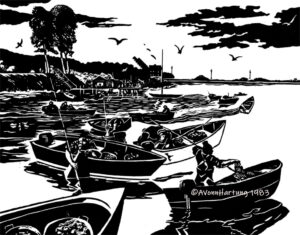
Grabado en madera/impreso a mano, que hice de mi padre (en el extremo derecho y George Cone a su izquierda) Cosechando vieiras en el estuario del río Niantic 1983, el año en que murió mi padre.
